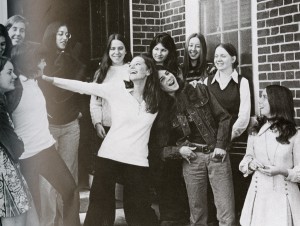By Rachel Shavel, A&S ’18, Hopkins Retrospective Student Assistant

University Archives Photograph Collection
As we celebrate Women’s History Month, Hopkins Retrospective would like to recognize the many women who have made Hopkins great. From the first women on campus, to groundbreaking faculty members, to graduates representing JHU in the field, the hospital, and on bookshelves, we’re proud of what our Hopkins women can do!
Hopkins did not always welcome women with open arms, however. Daniel Coit Gilman, the first president of Hopkins, supported the education of women but felt that it was best accomplished via women’s colleges rather than coeducational facilities. Enter our heroine, Christine Ladd-Franklin, who was admitted to graduate study in 1878 on the basis of her undeniably superior logic abilities and the support of influential Hopkins professor J. J. Sylvester. She was the first woman both to earn a Hopkins degree (she completed all requirements for it by 1882, but it was not officially awarded by the university until 1926) and to join the Hopkins Faculty of Philosophy (the precursor to today’s School of Arts & Sciences). Equality came at an uneven pace here at Hopkins: women were officially admitted to graduate programs in 1907 and part-time programs in 1909, though they would not be admitted as full-time undergraduates until 1970. The School of Medicine, though, has been open to both sexes since its doors opened in 1893. So, what have our intrepid Lady Jays been up to since their Hopkins days? Let’s check it out!
1959 Public Health graduate alumna Dr. Virginia Apgar was the first woman to become a full professor at Columbia University College of Physicians and Surgeons and, most notably, was the creator of the Apgar score, a method of evaluating a newborn’s health in the transition from womb to real world.
1979 graduate alumna Louise Erdrich is a celebrated author and poet and a recipient of the National Book Award for Fiction, the Anisfield-Wold Book Award, and the National Book Critics Circle Award for Fiction, among others.
1987 SAIS graduate alumna Carlyle Murphy became a long-time contributor to the Washington Post, author of two critically acclaimed books, as well as a recipient of the Pulitzer Prize for International Reporting.
2008 Public Health and Business graduate alumna Alison A. Hill has helped 4.5 million Kenyans get access to clean drinking water via her work with LifeStraw Carbon for Water.
2008 Arts & Sciences undergraduate and 2010 Education graduate alumna Yasmene L. Mumby has proven to be an invaluable asset to educational reform and was a driving force behind a $1.1 billion plan for improving Baltimore schools.
For more information on Hopkins’ influential women and the history of their presence on campus, be sure to check out these resources:
- Morgan, Julia B. Women at the Johns Hopkins University: A History. Baltimore: Johns Hopkins U, 1986. (Digital version also available)
- “Notable Hopkins Graduates.” Johns Hopkins University. Web. 13 Feb. 2015.
- Records of the Office of Public Information/News and Information, RG 10.020, Series 3, Box 3, Coeducation. University Archives, Sheridan Libraries.
- “A Timeline of Women at Hopkins.” Johns Hopkins Magazine. November 2007. Web. 13 Feb. 2015.
- “Great Coed-Spectations.” Johns Hopkins Magazine. November 1999. Web. 13 Feb. 2015.

I have to add that, though not a Hopkins Graduate (not possible at the time), Mary Elizabeth Garrett had a fundamental influence on women’s equality at Johns Hopkins.This is probably covered in another blog post, but it never hurts to mention this great woman’s name 🙂